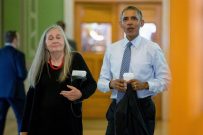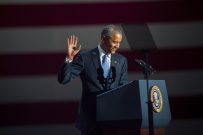Lashing Presidents to the Mast
The report presented to the President on surveillance and privacy yesterday makes two things clear: First, while many of the most important recommendations are legislative, the Administration could implement a broad array of them without waiting for Congress. Second, no Administration should be trusted to. President Obama now has an opportunity to do what no modern Chief Executive has done: shrink the powers of his office, lashing himself and future occupants of the Oval Office to a statutory mast. That would be a legacy.
The test of this report—which on a confessedly quick assessment looks to have more impressive teeth than one would guess for an internal review—is whether the Administration expends capital to implement it and whether it does so in a manner that strengthens the separation of powers. The latter inherently involves diminishing the power of the presidency. As to the former, the White House, having already once made the right noises about terrorism policy (“I intend to engage Congress about the existing Authorization to Use Military Force”) only to fail to follow through, bears a substantial burden to prove it means business this time.
The report makes several recommendations worthy of pursuit. Crucially, it focuses on legislative strategies rather than presidential unilateralism. Among the more important proposals is making the heretofore-farcical Foreign Intelligence Surveillance Court adversarial by appointing a Public Interest Advocate to represent civil liberties concerns. (It also suggests distributing appointments to the panel among Supreme Court justices.) The group recommends narrower statutory criteria for judicial approval of National Security Letters as well.
The Administration could act on many of these immediately, such as by declining to seek Letters that do not meet the proposed criteria. That will be the temptation—to preserve the underlying power by promising not to exercise it. That will also be insufficient. Bertrand de Jouvenel teaches that power itself is the danger, and it is power itself, in this case, that must be curbed.
All these, again, are provisional impressions from a quick read. Many devils are doubtless to be discovered in the ample details yet to be decided. But this much is clear: Making good on this report would involve committing what a certain school of scholarship, that obsessed with the “Great Man” theory of political history, has regarded as the cardinal presidential sin—soiling the executive nest by diminishing the powers of the office for its next occupant.
The anti-constitutional belief that successful presidents are inherently those who enlarge their powers has contributed substantially to the swollen status of the office. Were President Obama actually to throw elbows to implement a report restricting his own powers—and to seek its implementation in law such that it binds subsequent executives too—he would be performing a constitutional service actually worthy of historians’ honor.



